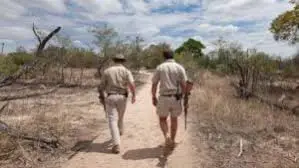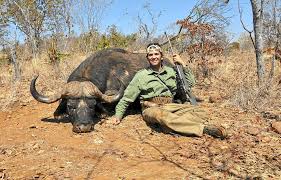
Introduction
Hunting tourism has transformed into a major economic sector, generating billions of rands annually across the globe, particularly in regions where wildlife and natural landscapes attract hunters. The industry’s estimated value of R44 billion underscores its significance not only as a source of income but also as a tool for conservation and community development. This article explores the multifaceted impact of hunting tourism, analyzing how it contributes to economies, supports conservation initiatives, and influences the socio-cultural fabric of host regions.
FOR MORE: https://africaheritagevoice.com/
The Economic Power of Hunting Tourism
Hunting tourism stands as a substantial economic pillar, especially in rural and remote regions where alternative sources of income are often scarce or underdeveloped. In countries such as South Africa, Namibia, and Zimbabwe, the industry has grown into a significant contributor to both local livelihoods and national economies. The staggering figure of R44 billion in revenue generated by hunting tourism underscores its critical role in supporting jobs, businesses, and public services.
Employment Opportunities Across Multiple Sectors
One of the most direct ways hunting tourism stimulates economic growth is through job creation. Rural communities, which often suffer from high unemployment and limited economic diversity, find new opportunities in this sector. Hunting tourism supports a wide array of jobs, ranging from highly specialized roles to entry-level positions.
Professional hunters and hunting guides represent the core workforce. These individuals possess extensive knowledge of wildlife behavior, tracking techniques, and safety protocols. Their expertise is vital not only for a successful hunting experience but also for ensuring compliance with conservation regulations. Many guides are local residents who have grown up with a deep understanding of their natural environment, allowing them to provide authentic and educational experiences to tourists.
Beyond the hunters and guides, hunting tourism sustains employment in associated services such as lodge management, hospitality, transportation, and equipment suppliers. Lodges and hunting camps provide accommodations and meals, employing cooks, cleaners, maintenance workers, and administrative staff. Transport providers facilitate access to remote hunting areas, often involving off-road vehicles, small aircraft, or boats. Meanwhile, local artisans and craft vendors benefit by selling souvenirs, traditional clothing, and handmade goods to visiting hunters.
The ripple effect of these jobs is significant: income earned by employees is spent within local economies, fueling further business activity and improving overall standards of living.
Stimulating Local Businesses and Ancillary Industries
Hunting tourism also generates demand for a broad range of goods and services beyond direct employment. Local businesses supplying food, fuel, firearms, ammunition, camping gear, and hunting equipment experience increased sales, creating a vibrant supply chain. This economic stimulation extends to sectors like vehicle maintenance, telecommunications, and construction, as infrastructure improves to support the growing tourism activities.
For example, remote rural roads and airstrips are often upgraded or maintained to facilitate access to hunting destinations. These improvements benefit communities year-round, enabling easier transport of goods and access to healthcare or education facilities.
Furthermore, hunting tourism can encourage entrepreneurship among local residents. Some may establish small businesses such as guiding services, handicraft production, or cultural tours. These ventures diversify income streams and reduce economic vulnerability by expanding the range of services available to tourists.
Contribution to National Gross Domestic Product (GDP)
At the macroeconomic level, hunting tourism contributes significantly to the GDP of countries rich in wildlife resources. The R44 billion revenue figure encompasses not only hunting permits and fees but also accommodation, transportation, food services, and other related expenditures made by tourists.
In South Africa, for instance, hunting tourism forms a substantial segment of the broader tourism sector, which accounts for a large share of the country’s GDP. The multiplier effect of tourist spending in rural areas creates additional income for communities and governments alike, making hunting tourism a valuable export industry.
Governments benefit through multiple channels: direct taxes on tourism-related businesses, licensing fees for hunting activities, and customs duties on imported equipment. These revenues can be substantial and are often earmarked for wildlife management and conservation programs, helping to sustain the natural assets that attract tourists in the first place.
Improving Rural Infrastructure and Public Services
Perhaps one of the most impactful economic benefits of hunting tourism lies in its role in improving infrastructure and public services in rural areas. The steady stream of income generated enables investments in essential amenities such as roads, clinics, schools, and communication networks.
Improved roads enhance accessibility not only for tourists but also for local residents, facilitating trade and access to markets. Reliable transportation infrastructure allows farmers and artisans to bring their products to urban centers, broadening their economic opportunities.
Healthcare facilities benefit when governments allocate resources derived from hunting tourism revenues. Clinics in remote areas may see better equipment, medicines, and trained personnel as a result. This, in turn, contributes to improved community health and workforce productivity.
Educational institutions also reap the benefits. Schools may receive funding for construction, supplies, and teacher salaries, enabling higher quality education. Enhanced education is crucial for long-term economic development, equipping young people with skills to diversify their future career options beyond hunting tourism.
Supporting Conservation Through Economic Incentives
While primarily an economic driver, hunting tourism often aligns with conservation goals. The financial incentives provided to landowners and communities to maintain wildlife habitats create a powerful economic rationale for protecting natural ecosystems. When hunting generates significant income, converting land to agriculture or other uses becomes less attractive.
Community-based conservation projects frequently reinvest hunting revenues into local development initiatives. This approach helps build local support for wildlife protection, reducing human-wildlife conflict and illegal poaching.
Challenges and Considerations
Despite the clear economic benefits, the industry is not without challenges. Overreliance on hunting tourism can make communities vulnerable to shifts in market demand, political instability, or changing regulations. For example, international bans on trophy imports can lead to sudden drops in tourist numbers and revenue.
Additionally, economic benefits are sometimes unevenly distributed, with profits concentrated among private operators or external investors rather than local communities. Ensuring fair benefit-sharing mechanisms and empowering local stakeholders remain critical for sustainable development.
Hunting tourism represents a powerful economic engine for rural areas in countries like South Africa, Namibia, and Zimbabwe. By creating jobs, stimulating local businesses, contributing to GDP, and enabling infrastructure improvements, the industry supports both livelihoods and conservation efforts. With responsible management and equitable governance, hunting tourism can continue to provide vital economic benefits for years to come.
Conservation and Sustainable Use of Wildlife
One of the key arguments supporting hunting tourism is its potential role in conservation. Properly regulated hunting can provide funds for wildlife management and anti-poaching efforts. Hunting operators often contribute to habitat restoration and species protection, as their business depends on healthy wildlife populations.
Revenue from hunting licenses and fees is frequently reinvested into conservation projects. For example, trophy hunting fees have been used to fund anti-poaching patrols, maintain protected areas, and support research initiatives. This creates incentives for local communities to preserve wildlife rather than convert land for agriculture or development.
However, this balance requires strict regulation and transparency to prevent overhunting and ensure ethical practices.
Social and Cultural Impacts of Hunting Tourism
Hunting tourism doesn’t only influence economies and ecosystems; it also affects the social and cultural dynamics of host communities. For many indigenous and rural populations, hunting is deeply rooted in tradition and identity. Hunting tourism can help preserve these cultural practices by providing economic incentives to maintain them.
Additionally, hunting tourism often encourages cultural exchange. Tourists engage with local guides and communities, learning about traditional hunting methods, folklore, and conservation philosophies. This interaction fosters mutual respect and understanding between visitors and hosts.
Moreover, the industry can empower marginalized groups, including women and youth, by creating employment and entrepreneurial opportunities. Community-based hunting projects often distribute income to local residents, helping reduce poverty and improve quality of life.
Yet, this impact varies widely. Some communities resist hunting tourism due to concerns over land rights, disruption of traditional ways of life, or ethical objections to trophy hunting. Therefore, successful hunting tourism projects prioritize community consultation and benefit-sharing to ensure social sustainability.
Controversies and Ethical Considerations
Despite its economic and conservation benefits, hunting tourism remains highly controversial. Critics argue that trophy hunting, in particular, is unethical and damages animal populations. High-profile cases of hunting celebrities and endangered species have fueled public outrage and campaigns to ban or restrict hunting tourism.
Animal welfare organizations claim that trophy hunting promotes unnecessary killing for sport rather than subsistence. They argue that the economic benefits are often exaggerated and that ecotourism alternatives (such as photographic safaris) can generate similar or greater revenue without harming wildlife.
On the other hand, proponents argue that regulated hunting can be a sustainable use of natural resources. They contend that hunting fees provide critical funding for conservation and community development, often more reliably than tourism that depends on photographic experiences. Furthermore, hunters often target older, non-breeding animals, reducing impact on population viability.
Ethical hunting requires transparency, strict quotas, and adherence to local and international laws. Ensuring hunting tourism benefits local communities rather than external operators is also a key concern. Many argue that with proper management, hunting tourism can coexist with conservation and ethical standards.
Case Studies: Successful Hunting Tourism Models
South Africa: Balancing Economy and Conservation
South Africa is often cited as a leading example of how hunting tourism can benefit both conservation and local economies. The country’s private game reserves and hunting farms generate substantial income through hunting permits and safari packages. With an estimated R44 billion industry nationwide, South Africa has developed a sophisticated regulatory framework ensuring sustainable use of wildlife.
Hunting operators are required to adhere to quotas, and fees from trophy hunting are reinvested in habitat preservation and anti-poaching initiatives. Additionally, many local communities participate in joint ventures, receiving a share of the profits, which incentivizes them to protect wildlife.
Namibia: Community-Based Natural Resource Management
Namibia’s Community-Based Natural Resource Management (CBNRM) program empowers rural communities to manage wildlife resources on their land. Through regulated hunting tourism, communities generate income while maintaining traditional conservation practices.
The CBNRM initiative has been internationally praised for creating sustainable livelihoods and reducing human-wildlife conflict. Hunting fees contribute to local infrastructure and social services, supporting long-term development goals.
Zimbabwe: Challenges and Opportunities
Zimbabwe’s hunting tourism has historically been a vital source of foreign currency and rural employment. However, political instability and economic challenges have affected the industry. Despite this, hunting tourism remains a key component of Zimbabwe’s conservation strategy, especially in national parks and private conservancies.
The country has worked to improve transparency and regulation to revive international confidence. Lessons from Zimbabwe emphasize the importance of good governance in sustaining hunting tourism’s benefits.
The Future of Hunting Tourism and Economic Outlook
Looking forward, the future of hunting tourism presents a complex mixture of promising opportunities and formidable challenges. On the one hand, global demand for hunting experiences continues to grow steadily, particularly among affluent tourists from regions such as Europe, the United States, and increasingly, Asia. These tourists are often attracted by the unique chance to engage with wildlife and natural landscapes in ways that combine adventure, tradition, and exclusivity. However, this upward trend in demand is met with growing scrutiny from animal rights groups, environmental activists, and a shifting global public attitude towards wildlife conservation and ethical treatment of animals. These factors are shaping evolving regulations, public perceptions, and market dynamics in hunting tourism.
Growing Global Demand Amid Changing Demographics
Despite increasing opposition in some quarters, hunting tourism is expanding into new markets and demographics. For example, wealthy travelers from China and other parts of Asia have shown rising interest in international hunting safaris, fueled by greater disposable income and a desire for novel luxury experiences. Additionally, some European and American hunters are seeking more remote, pristine locations, often choosing destinations in Africa, Eastern Europe, and Central Asia where hunting permits are still available for iconic species.
The appeal of hunting tourism also lies in the diversity of experiences it offers. Beyond the traditional trophy hunting, many tourists seek specialized hunts targeting specific species, including elusive predators, rare herbivores, or even indigenous small game. This diversification enables operators to cater to different budgets, interests, and conservation ethics, potentially expanding the market base further.
However, to capitalize on these opportunities, hunting tourism must continually adapt to the changing preferences of modern travelers who are increasingly conscious of sustainability, ethical hunting, and the broader impact of their activities. Tourists today want assurance that their hunting experiences contribute positively to conservation and community development rather than causing harm.
Regulatory Landscape and Ethical Pressures
The regulatory framework governing hunting tourism is under increasing pressure to evolve. International bodies such as CITES (Convention on International Trade in Endangered Species of Wild Fauna and Flora) impose strict rules on the hunting and trade of endangered species, which many countries adopt and enforce. Moreover, national governments face domestic pressure to tighten hunting laws, introduce more rigorous permit systems, and enforce anti-poaching regulations more effectively.
Animal welfare organizations and advocacy groups continue to lobby for bans or severe restrictions on trophy hunting, particularly targeting controversial practices involving endangered species or celebrity hunters. These campaigns are often amplified by social media, which shapes public opinion rapidly and globally. As a result, some countries have already enacted bans or moratoriums on trophy hunting, affecting their tourism revenues and conservation funding.
In response, hunting tourism operators are increasingly adopting transparency and certification schemes to demonstrate ethical practices. Initiatives such as the “Fair Chase” principle, which promotes humane and legal hunting methods, or third-party certifications for sustainable hunting, are becoming more common. These measures aim to reassure customers and regulators alike that hunting tourism can coexist with conservation priorities and animal welfare concerns.
Technological Innovations Supporting Sustainability
Technological advances are playing an increasingly critical role in shaping the future of hunting tourism by enhancing the sustainability and monitoring of wildlife populations. Modern tools such as drones equipped with high-resolution cameras are revolutionizing anti-poaching efforts, enabling rangers to monitor vast and often inaccessible areas in real-time. This increased surveillance helps reduce illegal hunting and ensures that hunting quotas are respected.
Data analytics and artificial intelligence (AI) are also transforming wildlife management. By collecting and analyzing data on animal populations, migration patterns, and habitat conditions, conservationists and hunting operators can make more informed decisions regarding hunting quotas and timing. This scientific approach helps maintain ecological balance and prevents overexploitation of species.
GPS tracking collars and satellite imagery allow for ongoing monitoring of key species, which informs adaptive management strategies. These technologies also aid in assessing the impact of hunting tourism on ecosystems, ensuring that the industry’s footprint remains minimal.
Furthermore, digital platforms are enhancing the transparency of hunting tourism transactions. Online booking systems, permit tracking, and digital record-keeping ensure accountability and streamline interactions between hunters, operators, and regulators. Such integration fosters trust and facilitates compliance with ethical and legal standards.
Integration with Broader Conservation and Ecotourism Initiatives
To build resilience and diversify income streams, many hunting tourism operations are increasingly integrating with broader conservation and ecotourism initiatives. This holistic approach balances the economic benefits of hunting with non-consumptive uses of wildlife, such as photographic safaris, birdwatching, and cultural tourism.
By offering mixed tourism packages that include both hunting and non-hunting activities, operators attract a wider range of visitors and reduce dependence on hunting revenue alone. This integration also promotes a more comprehensive conservation ethos, fostering appreciation for wildlife beyond the hunting experience.
Community-based conservation projects that link hunting permits with direct benefits for local people have shown particular promise. For instance, revenues from hunting tourism are often reinvested into community health, education, and infrastructure projects. This creates incentives for local stakeholders to protect wildlife habitats and combat illegal poaching.
Such models encourage cooperation between hunting operators, conservation organizations, and indigenous communities, creating win-win scenarios that enhance biodiversity while improving livelihoods.
Economic Outlook and the Role of Governance
Economic forecasts for hunting tourism are cautiously optimistic. If responsibly managed, the industry is poised to continue generating billions of rands in revenue annually, providing crucial support for rural economies and conservation initiatives globally. The sector’s ability to attract high-spending tourists means it can serve as a significant source of foreign exchange, particularly in developing countries with abundant wildlife resources.
However, the sustainability of this economic contribution hinges on several critical factors. Transparent governance is paramount; clear, enforceable regulations, along with accountability mechanisms, are needed to prevent corruption, overhunting, and misuse of funds. Countries with strong institutions and effective law enforcement are better positioned to benefit from hunting tourism without compromising conservation goals.
Ethical practices must be entrenched at all levels of the supply chain—from licensing authorities and hunting outfitters to guides and local communities. This includes respecting quotas, ensuring humane treatment of animals, and prioritizing species conservation.
Community involvement is equally vital. Without genuine participation and fair benefit-sharing, hunting tourism risks alienating local populations, leading to conflicts, land-use disputes, and unsustainable practices. Empowering communities to manage and benefit from wildlife resources fosters stewardship and long-term success.
Adaptability will be essential. Hunting tourism operators and policymakers must stay responsive to evolving market trends, regulatory changes, and societal values. Embracing innovation, promoting transparency, and prioritizing sustainability will determine the future trajectory of this multi-billion-rand industry.
Conclusion
Hunting tourism is a complex and often contentious industry, yet its economic impact—estimated at R44 billion—is undeniable. When managed responsibly, hunting tourism can be a powerful tool for wildlife conservation, rural development, and cultural preservation. By learning from successful models and addressing ethical concerns, stakeholders can help ensure that hunting tourism remains sustainable and beneficial for all involved.
References and Further Reading
- World Wildlife Fund (WWF) – Trophy Hunting and Conservation
- Namibia’s Community-Based Natural Resource Management (CBNRM) Program
- South African Department of Environmental Affairs – Hunting Regulations
- Lindsey, P.A., Roulet, P.A., & Romanach, S.S. (2007). Economic and conservation significance of the trophy hunting industry in sub-Saharan Africa. Biological Conservation, 134(4), 455-469.
Link to paper - International Union for Conservation of Nature (IUCN) – Sustainable Use of Wildlife




